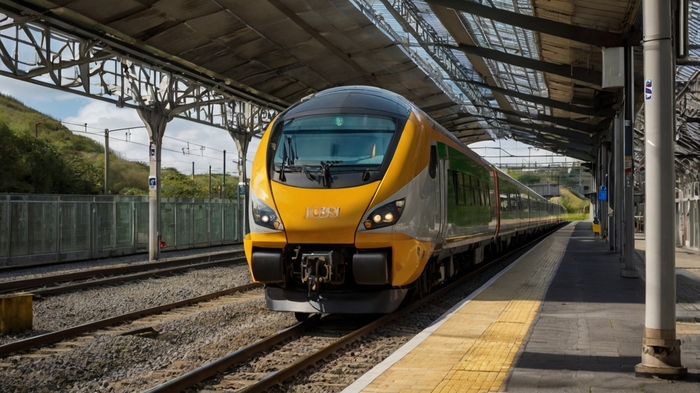Friday, July 25, 2025
Irish Rail has teamed up with Jacobs to spearhead a significant modernization project that will transform Ireland’s rail network. This partnership aims to expand track capacity, increase travel speeds, and reduce emissions, positioning the rail system for a more sustainable future. With a focus on enhancing connectivity and sustainability, the initiative is designed to offer passengers a faster, more efficient, and environmentally friendly travel experience. This collaboration aligns with Ireland’s climate goals and sets the stage for a greener transportation infrastructure that benefits both commuters and the environment.
Modernizing Rail Infrastructure for Better Connectivity
The collaboration with Jacobs will see multi-disciplinary consulting provided by the firm on the 87-mile (140km) stretch between Galway and Portarlington. This project is set to revolutionize the passenger experience by improving both speed and accessibility, in line with the goals set by the All Island Strategic Rail Review. The initiative is poised to create an efficient and integrated rail network that connects key cities across the island while making train travel more attractive for commuters.
The partnership agreement, lasting four years with the potential for an eight-year extension, involves conducting detailed feasibility studies and identifying optimal solutions for major upgrades to the existing rail infrastructure. This planning phase is designed to guarantee that the project not only meets current travel demands but is also flexible enough to accommodate future needs.
Jacobs’ technical expertise will ensure that integrated planning solutions are implemented, focusing on urban development concerns and creating sustainable transportation alternatives. The scale and complexity of the project necessitate a comprehensive approach to urban mobility, and Jacobs’ involvement will be crucial in delivering long-term, environmentally sound solutions.
Advancing National Sustainability and Climate Commitments
The rail project is aligned with Ireland’s national development plans, including Project Ireland 2040 and the National Development Plan (2018-2027), both of which emphasize compact growth and climate resilience. As part of these initiatives, the rail modernization project aims to provide more sustainable alternatives to car travel and help reduce emissions, making it a critical piece of Ireland’s commitment to climate neutrality.
By enhancing the rail system, the project will reduce reliance on cars, contributing to Ireland’s goal of lowering its carbon footprint. Train travel offers a greener alternative to driving, and by making it a more viable and attractive option for commuters, the rail network will help shift public transport usage toward sustainable modes of travel. This transformation is integral to Ireland’s strategy for meeting its climate targets, as public transportation continues to be a key area of focus in reducing nationwide emissions.
Additionally, the project is designed to benefit local communities, as improved connectivity will create better access to essential services, employment, and education opportunities. By reducing congestion on roads, it will also improve the overall quality of life for people in both urban and rural areas, driving economic growth and enhancing regional accessibility.
Jacobs’ Expertise in Major Infrastructure Projects
Jacobs has a strong track record in delivering large-scale infrastructure projects across Ireland and internationally. In Ireland, the firm has contributed to projects like the East Coast Railway Protection Program and the BusConnects initiatives in Dublin and Cork. On a global scale, Jacobs has played a key role in major rail projects such as the UK’s Transpennine Route Upgrade in collaboration with Network Rail.
The firm’s extensive experience in the rail sector will be instrumental in the successful completion of this modernization project. Jacobs’ role will involve applying technical expertise, sustainable planning, and innovative design to ensure that the Galway to Portarlington corridor upgrade delivers not only improved connectivity and service but also long-term sustainability.
Shaping the Future of Ireland’s Rail Network
This partnership represents a major leap forward in Irish Rail’s plans to modernize its network. By increasing track capacity and improving service frequency, the rail system will provide passengers with faster and more convenient travel options, benefiting both commuters and tourists alike. The improvements will strengthen the connection between key towns and cities, enhancing accessibility to jobs, services, and cultural opportunities.
In addition to providing faster and more reliable travel, the project will contribute to Ireland’s environmental goals by reducing carbon emissions. As part of the broader push for a more sustainable transportation system, the rail expansion will serve as a model for environmentally responsible infrastructure development in Ireland. The partnership with Jacobs, a leader in sustainable infrastructure, will ensure the project aligns with national climate goals and contributes to a greener, more resilient rail network.
A New Era for Sustainable Rail Travel in Ireland
Through its collaboration with Jacobs, Irish Rail is poised to lead the way in transforming Ireland’s transportation system. The project will provide passengers with a modern, efficient, and sustainable travel option that supports national climate targets. By making rail travel more attractive and accessible, the expansion of the Galway to Portarlington corridor is set to revolutionize how people travel in Ireland while contributing to the country’s broader sustainability goals.
In conclusion, the joint effort between Irish Rail and Jacobs will pave the way for a greener, more efficient, and sustainable rail network in Ireland. With enhanced service and connectivity, the project promises to improve passenger experience, reduce emissions, and help Ireland meet its climate targets, ensuring a more sustainable transportation future for generations to come.
